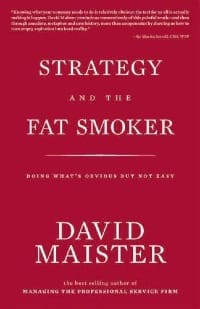New Book Review: "Strategy and the Fat Smoker"
New book review for Strategy and the Fat Smoker: Doing What's Obvious But Not Easy, by David H. Maister, The Spangle Press, 2008:


When I first saw this title, I was inclined to think that the author had intended the phrase "fat smoker" to be an oxymoron, because at least in my experience, there are very few smokers who are overweight. But after reading what Maister has to share in his most recent effort (see my reviews for some of his other texts, such as "Managing the Professional Service Firm", "First Among Equals: How to Manage a Group of Professionals", and "The Trusted Advisor"), I came to realize that he was describing himself.
In setting the stage, Maister notes in the first chapter that "many change efforts are based on the assumption that all you have to do is explain to people that their lives could be better, convince them that the goals are worth going for, and show them how to do it. But this assumption is patently false. If it were true, there would be no drug addicts, no alcoholics, or bad marriages in the world. 'Oh, I see, this behavior's not good for me? Ah well then, I'll stop, of course!' What nonsense!"
"And yet strategic plans and annual speeches by CEOs, managing partners, management consultants, and others continue to adopt this same useless structure: 'Look at how fabulous it would be if you were a fit, nonsmoking exerciser, David!' My usual response? 'True, but please shut up and go away.'" Later, the author follows up by drawing a parallel between the reasons for his sudden move to stop smoking, start exercising, and losing weight, and how change often finally comes about in the business world.
"We all know the main thing that works: a major crisis! If revenues drop off sharply, it's amazing how quickly businesses can act to deal with known inefficiencies and bad habits they could have tackled years ago." After discussing some of the aspects that are known about persuading people of change before the "heart attack" comes, the author brings up what will probably hit home to many business professionals, in professional services firms or elsewhere.
"Everyone in the organization has to decide if they want to try hard enough to sacrifice some of the present to achieve a better tomorrow. They may do so if they believe that the effort is serious. They definitely will not if they think those at the top are undecided or divided. Professional firms are afraid of this conclusion. They try to work around the skeptics, the nonbelievers, and the nonparticipants in their senior ranks, preferring to hold on to revenue volume rather than put together a senior team whose members are equally committed to reaching. That's fine, but you can't call it strategy."
As a consultant, one aspect that I appreciated about this book is that after an illustrious career and several popular books, Maister takes the risk that exposing some of his past and present faults will drive home the points that he attempts to make. And by and large, in my opinion he is successful doing so. In addition to the introductory chapters, I also especially enjoyed chapter 6 ("Do You Really Want Relationships?"), chapter 9 ("Tyrants, Energizers, and Cynics"), chapter 10 ("Why Most Training is Useless"), and chapter 19 ("Passion, People, and Principles").
This third chapter that I have listed, in my opinion, is one of the best chapters that Maister has ever written, and should be required reading for anyone already in the business world, or preparing to enter it, especially those interested in management. As he mentions in his introductory statements to this chapter, most companies use training as a business version of a "quick weight loss" program. "They hope that by training people in new things, they can quickly bring about behavioral changes among their employees. It almost never works." Why? Because training is an almost useless first step in a committed program for long-term change, especially when it is being used as a substitute for changes in managerial behavior.